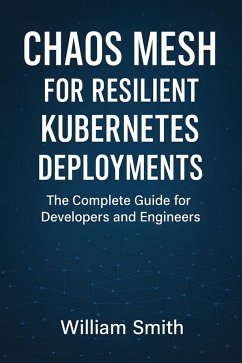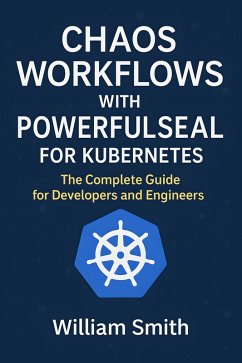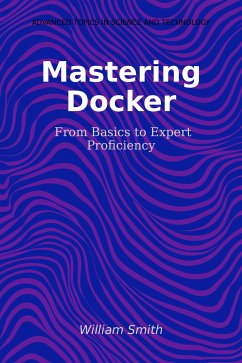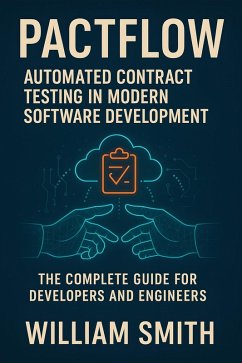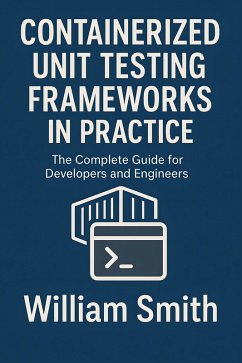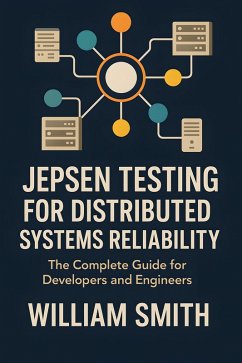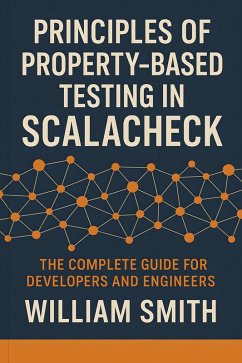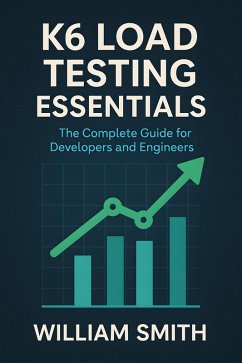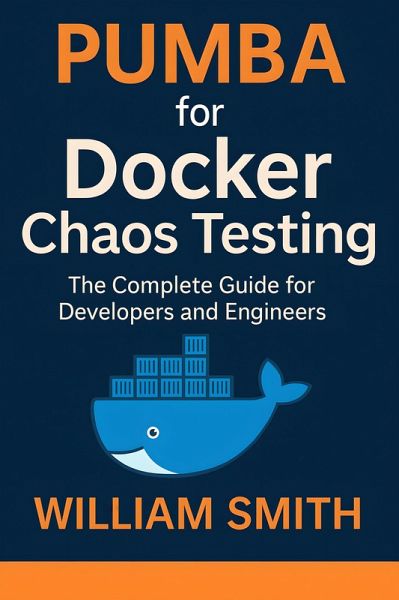
Pumba for Docker Chaos Testing (eBook, ePUB)
The Complete Guide for Developers and Engineers
Sofort per Download lieferbar
8,52 €
inkl. MwSt.

PAYBACK Punkte
0 °P sammeln!
"Pumba for Docker Chaos Testing" Designed for engineers, architects, and resilient-system practitioners, "Pumba for Docker Chaos Testing" is a comprehensive guide to mastering chaos engineering techniques using the open-source tool, Pumba. The book introduces advanced concepts in chaos engineering, delving into the classification of failure modes in distributed systems, the structured formulation of hypotheses for chaos experiments, and vital strategies for risk assessment, mitigation, and ethical compliance. Readers will gain a deep understanding of how to measure and benchmark system resilie...
"Pumba for Docker Chaos Testing"
Designed for engineers, architects, and resilient-system practitioners, "Pumba for Docker Chaos Testing" is a comprehensive guide to mastering chaos engineering techniques using the open-source tool, Pumba. The book introduces advanced concepts in chaos engineering, delving into the classification of failure modes in distributed systems, the structured formulation of hypotheses for chaos experiments, and vital strategies for risk assessment, mitigation, and ethical compliance. Readers will gain a deep understanding of how to measure and benchmark system resilience, embed chaos testing into continuous delivery pipelines, and navigate the complexities of conducting high-stakes, hypothesis-driven disruption in modern microservices environments.
The core sections of the book offer a meticulous exploration of Pumba itself-detailing its internal architecture, installation strategies, security considerations, extensibility, and a thorough comparison with alternative chaos engineering tools. It covers the full breadth of Pumba's capabilities, including powerful command-line operations, granular target selection, advanced scheduling, diagnostics, and experiment lifecycle management. Specialized chapters walk through orchestrating sophisticated experiments, from injecting targeted network faults (latency, packet loss, partitions, and protocol chaos) to simulating process failures, CPU and memory stress, storage faults, and even chaining multiple attack vectors for comprehensive system stress-testing.
Beyond tool mastery, the work presents practical patterns and best practices for integrating chaos experiments into the broader Docker and orchestrator ecosystem-including Swarm and Kubernetes scenarios, CI/CD pipeline automation, and service mesh deployments. Readers will discover advanced techniques for designing reproducible, automated, and large-scale experiments, combined with observability strategies to correlate system behavior, enable root cause analysis, and automate remediation. Looking ahead, the book illuminates the frontiers of chaos engineering with AI-driven experimentation, federated cloud testing, security-focused chaos scenarios, and ongoing community innovation-making it an essential resource for building robust, failure-ready cloud-native systems.
Designed for engineers, architects, and resilient-system practitioners, "Pumba for Docker Chaos Testing" is a comprehensive guide to mastering chaos engineering techniques using the open-source tool, Pumba. The book introduces advanced concepts in chaos engineering, delving into the classification of failure modes in distributed systems, the structured formulation of hypotheses for chaos experiments, and vital strategies for risk assessment, mitigation, and ethical compliance. Readers will gain a deep understanding of how to measure and benchmark system resilience, embed chaos testing into continuous delivery pipelines, and navigate the complexities of conducting high-stakes, hypothesis-driven disruption in modern microservices environments.
The core sections of the book offer a meticulous exploration of Pumba itself-detailing its internal architecture, installation strategies, security considerations, extensibility, and a thorough comparison with alternative chaos engineering tools. It covers the full breadth of Pumba's capabilities, including powerful command-line operations, granular target selection, advanced scheduling, diagnostics, and experiment lifecycle management. Specialized chapters walk through orchestrating sophisticated experiments, from injecting targeted network faults (latency, packet loss, partitions, and protocol chaos) to simulating process failures, CPU and memory stress, storage faults, and even chaining multiple attack vectors for comprehensive system stress-testing.
Beyond tool mastery, the work presents practical patterns and best practices for integrating chaos experiments into the broader Docker and orchestrator ecosystem-including Swarm and Kubernetes scenarios, CI/CD pipeline automation, and service mesh deployments. Readers will discover advanced techniques for designing reproducible, automated, and large-scale experiments, combined with observability strategies to correlate system behavior, enable root cause analysis, and automate remediation. Looking ahead, the book illuminates the frontiers of chaos engineering with AI-driven experimentation, federated cloud testing, security-focused chaos scenarios, and ongoing community innovation-making it an essential resource for building robust, failure-ready cloud-native systems.
Dieser Download kann aus rechtlichen Gründen nur mit Rechnungsadresse in A, B, BG, CY, CZ, D, DK, EW, E, FIN, F, GR, H, IRL, I, LT, L, LR, M, NL, PL, P, R, S, SLO, SK ausgeliefert werden.




